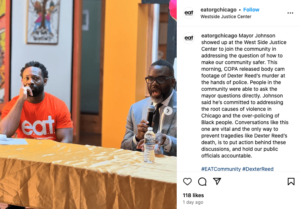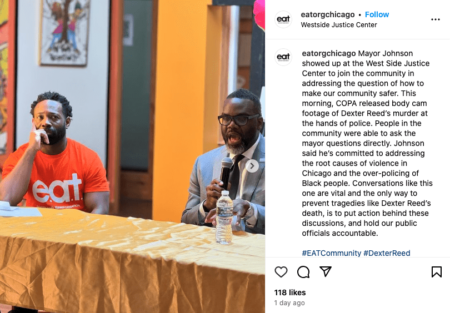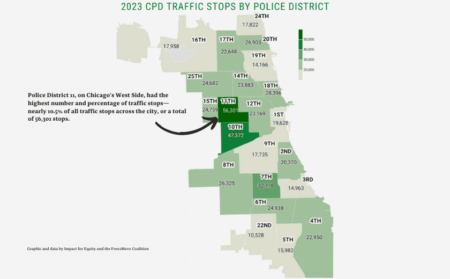- The McDonald’s where Kenia Campeando was working when she tested positive for COVID-19.
-
Sebastián Hidalgo for Reveal
This story was originally published by Reveal from the Center for Investigative Reporting.
Last October, as coronavirus cases began to slowly climb throughout Chicago, Kenia Campeando arrived at a brick McDonald’s on the southwest side, where the 31-year-old had worked for nearly two years as a cook. Despite the pandemic, the store did a bustling business, and this particular day felt busier than usual, with customers gathered inside and a line of cars snaking through the drive-thru. As she hustled to assemble orders, the store manager arrived, saw the backup and asked why so few employees had shown up. “They called in sick,” a shift supervisor replied.
In the past, there had been rumors that workers had contracted COVID-19 at the Kedzie Avenue outlet, though Campeando had never been notified that she had been exposed. Still, it wasn’t hard to imagine how the virus could reach her. In the drive-thru area, she said, it wasn’t uncommon for four or five workers to crowd together, and even basic supplies could run out. “There were times when we didn’t have soap for two or three days, when we didn’t have hand sanitizer, when we ran out of gloves, too,” she said.
After clocking out that day, Campeando went home and began to feel feverish. She stayed home for several days as her fever spiked and she suffered body aches and shortness of breath. Soon, a COVID-19 test came back positive. Within days, the rest of her family tested positive as well: her husband and three children, including their five-month-old baby, along with her brother, who lived with them. While recuperating at home for three weeks, she filed a complaint with the federal Occupational Safety and Health Administration, alleging that the restaurant was endangering workers’ lives by failing to enforce social distancing or alert workers to possible exposure so they could quarantine, while also failing to provide masks and at times running out of soap.
In the complaint, filed with the help of the Service Employees International Union, Campeando wrote that she had learned that five coworkers currently had COVID-19 and that two floating workers—who moved from store to store and had worked at the Kedzie Avenue McDonald’s—had died from the disease. “Their families did not even have the money to pay for a burial,” she wrote.
Campeando was not alone. Through March of this year, more than 2,200 complaints related to COVID-19 at fast food restaurants were filed with OSHA, and her complaints—the lack of masks, the inability to social distance—were among the most common. At a McDonald’s in Radcliff, Kentucky, a worker complained that managers wore their masks “hanging from one ear” and that symptomatic employees were being told to complete their shifts. At another in Goshen, Indiana, an employee complained that workers who had tested positive for COVID-19 continued to work and that the employer threatened employees who wanted to quarantine. And in El Monte, California, a worker complained that a fellow employee who tested positive for COVID-19 was told by a supervisor to continue to work in the back of the store instead of being sent home.
Yet tens of millions of dollars in forgivable federal loans have flooded the troubled fast food industry, including more than $51 million that went to at least 110 outlets facing COVID-19 safety complaints, according to an analysis by Reveal from The Center for Investigative Reporting.
The dangers rippled far beyond the workplace, with evidence indicating that the fast food industry’s failures to protect its frontline workforce of 3.45 million may have helped drive COVID-19’s spread. Last month, the Los Angeles chapter of Physicians for Social Responsibility published a report that investigated fast food worker complaints and outbreaks in California. The report found that “workplace transmission among fast-food restaurant workers has been a potentially significant, ongoing contributor to the COVID-19 pandemic as well as to disparities in COVID-19 disease burdens.” Although national data is not available, a report in March by the UCLA and UC Berkeley Labor Center reported that in Los Angeles County, nine out of ten fast food workers are people of color, including nearly three-quarters who are Latinx, a community that has faced disproportionate disease burdens and death during the pandemic.
Fast food restaurants accepted money from the federal Paycheck Protection Program on the condition that they follow all federal workplace safety requirements. The PPP’s borrower application form states: “Signing this form is certification that the applicant, to the best of its knowledge, is in compliance with the applicable OSHA requirements, and will remain in compliance during the life of the loan.”
Among the 110 restaurants facing OSHA complaints whose owners received PPP loans was the store on Kedzie Avenue where Campeando works. That store’s owner, Carmen Solano-De Carrier, received a $550,000 PPP loan in April 2020.
Solano-De Carrier operates 15 McDonald’s through the Solano-De Carrier Management Co., most of them in the Chicago area. When reached by phone, she declined to speak to Reveal, but she provided a written statement through McDonald’s USA. In it, she said that masks had been supplied to the store in late April and that “there have been no breaks in supply for gloves, soap or masks.” McDonald’s USA, whose corporate and franchise stores have received more than 150 complaints related to COVID-19, wrote in response to questions about workplace safety that the company had “enhanced over 50 operational and safety processes in restaurants, including requiring masks, gloves and daily wellness checks.”
The PPP is administered by the Small Business Administration, and the loans are generally forgivable. But while borrowers must attest that they will follow OSHA regulations, they face no consequences from the SBA if they fail to do so, such as being forced to repay the loans. The SBA never issued a requirement that borrowers provide paid sick time to their employees affected by COVID-19, though paid sick leave was the subject of another COVID-19 stimulus bill.
“Public health requirements are not a matter for eligibility consideration for a PPP loan or PPP loan forgiveness,” Matt Coleman, a spokesperson for the SBA, said by e-mail.
David Michaels, the former head of OSHA under President Barack Obama and now a public health professor at George Washington University, described the lack of worker protections in the PPP as a “tremendously missed opportunity.” He pointed to a previous stimulus bill, the American Recovery and Reinvestment Act of 2009, passed during the Great Recession. That stimulus plan, like the PPP, invested billions of dollars to keep workers employed. Yet the 2009 legislation also allocated $80 million to the Department of Labor, which allowed OSHA to conduct thousands of inspections at worksites where employers had received stimulus funds.
No such funding was provided through the CARES Act, the legislation that created the PPP. In fact, under former President Donald Trump, OSHA frequently failed to inspect workplaces even when the agency received COVID-19 complaints from workers, often closing cases after simply corresponding with employers. According to OSHA records, of the more than 2,200 COVID-19 complaints targeting fast food restaurants, inspectors have visited 116 stores, or less than 6 percent. Nearly 1,600 of those complaints were closed without an inspection.
- Kenia Campeando filed one of more than 2,200 complaints with OSHA related to COVID-19 at fast food restaurants.
-
Sebastián Hidalgo for Reveal
That’s precisely what occurred at the McDonald’s in Chicago. On July 13, three months before Campeando contracted COVID-19, another worker at the same store, Adriana Sanchez, lodged an OSHA complaint alleging that the store wasn’t providing workers with adequate masks. By that time, Chicago had become a hub of worker complaints, with a judge issuing an injunction in June against several other McDonald’s owners, ordering them to adopt new safety measures for social distancing, training, and masks.
Sanchez, 43, had worked as a cashier at the store for nearly three years. In response to her complaint, Antoine Evans, a Solano-De Carrier operations consultant, wrote to OSHA: “We have evaluated our work place and continue to work with all our employees with the safety guidelines to keep them safe.” The correspondence from McDonald’s included photos of workers washing their hands, wearing their masks, and practicing social distancing, along with boxes of gloves, one box of masks, and soap and sanitizer. OSHA closed the complaint by July 26 without inspecting the workplace or speaking with Sanchez.
Despite the photos, Sanchez and Campeando told Reveal that throughout the summer and into the fall, the store regularly ran out of gloves, soap, and hand sanitizer. Social distancing was not enforced, and if workers asked for masks, they were told the store didn’t have any, though both Sanchez and Campeando said there was a separate supply of masks for unmasked customers.
By October, the women’s frustration was building. Once Sanchez learned that Campeando had fallen ill with COVID-19, the two women went on strike with support from Fight for $15, the service employees union’s campaign to organize fast food workers. While on strike, Sanchez filed a second OSHA complaint, this one echoing Campeando’s claims and criticizing OSHA for its “inadequate previous investigation” in response to her first complaint in July. Both women eventually returned to work, but a week after returning, Sanchez also contracted COVID-19. She was also out for nearly three weeks to recuperate.
Once back at work, Sanchez and Campeando each asked for two weeks of paid sick time to cover most of the time they were out with COVID-19, something required of businesses with less than 500 employees in the Families First Coronavirus Response Act, the second in a series of coronavirus relief bills passed last year. But their manager told them that they didn’t qualify because the company’s total workforce across the 15 outlets exceeded that number. Instead, the two women said they used what little paid sick time they had earned: 14 hours for Sanchez and eight for Campeando. Later, the store manager agreed to give Campeando an additional week of paid time. “He said it was because I was a good worker and it came from his heart,” she said.
Through a McDonald’s USA spokesperson, Solano De-Carrier said the company asks employees to stay home when sick and is “offering paid sick leave to those impacted by the virus,” though the one week Campeando received covered only a fraction of the time she was out.
In January, an OSHA inspector did visit the Kedzie Avenue McDonald’s in response to the new complaints. By this time, Campeando and Sanchez said, the store had implemented new procedures and protections, including temperature screenings for workers, the installation of dividers between workstations and the spreading out of cash registers to allow for social distancing. OSHA issued no violations.
Still, problems persisted. Sanchez said that in March of this year, she asked a supervisor for a mask and was told the store was out—a full eight months after she had filed her first OSHA complaint about that very issue. v
Reporter Lance Williams contributed to this story. It was edited by Esther Kaplan and Sumi Aggarwal and copy edited by Nikki Frick.
Gabriel Thompson can be reached at thompson.gabriel@gmail.com. Follow him on Twitter: @G_Thompson1.






